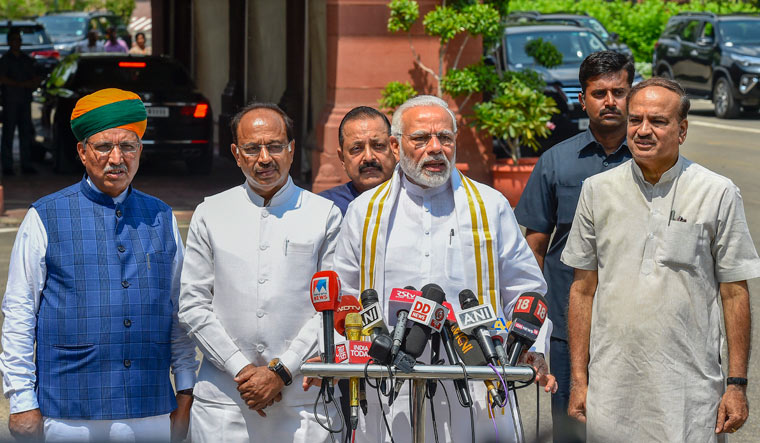After the start of the Monsoon Session of Parliament on Wednesday, Speaker Sumitra Mahajan announced she had accepted the motion of no confidence against the Modi government moved by the TDP over the issue of separate statehood for Andhra Pradesh.
In the run-up to the Monsoon Session, the Congress, TDP and NCP had declared that they would move a no-confidence motion against the Modi government. Speaking in Parliament on Wednesday, Congress MP Jyotiraditya Scindia declared, “The govt which led farmers to commit suicide, under whose regime women are being raped everyday...we move no confidence motion against you.”
The speaker said she would announce the date of taking up the no-confidence motion for discussion in a “couple of days”. The motion is expected to see extensive discussion, criticism and defence of the Modi government's policies before an actual vote is held. The NDA is expected to win a trust vote, but the discussions will provide an opportunity to the opposition to question and criticise the Modi government on its record. In the Budget Session of Parliament, several opposition parties had announced plans to move a motion of no confidence, but the speaker did not take them up, citing disruption of Parliament.
While the Rajya Sabha was adjourned shortly after convening on Wednesday, MPs of the Samajwadi Party and TDP stormed into the well of the Lok Sabha to protest incidents of mob lynching and delay in special status for Andhra Pradesh, respectively.
The stormy start came even as Prime Minister Narendra Modi declared earlier on Wednesday his government was ready to discuss any issue raised by different political parties.
Briefly interacting with reporters, Modi affirmed he had always strove for a productive session in Parliament and “will continue to do so”. He also called for extensive discussions on important issues of national interest. Modi said, “We hope for good suggestions and discussions from all experienced members.”
The Monsoon Session, which concludes on August 10, is scheduled to have 18 sittings.
Modi had chaired an all-party meeting ahead of the Monsoon Session on Tuesday, which had a “positive outcome”, according to Union Parliamentary Affairs Minister Ananth Kumar.
As many as 46 bills and two financial matters figure in the legislative business for the Monsoon Session. The prominent ones among these are The Muslim Women (Protection of Rights on Marriage) Bill or the anti-instant triple talaq bill, The Constitution (123rd Amendment) Bill, that gives constitutional status to the National Commission for Backward Classes, and The National Medical Commission Bill.
The Monsoon Session comes into focus as it comes at a time when the Modi government has less than a year left before its term ends. Furthermore, the Monsoon Session comes after much criticism of the recently “washed-out” Budget Session, which was described as the “least productive” session of Parliament in 18 years, due to protests by the AIADMK on the Cauvery issue and the TDP and YSR Congress on special status for Andhra Pradesh.
The Congress had criticised the AIADMK as stalling Parliament during the Budget Session at the behest of the BJP in a bid to prevent a no-confidence motion from being moved. Interestingly, senior Congress leader Shashi Tharoor referred to such “proxy disruption” in a tweet on Wednesday morning.
(With agency inputs)

